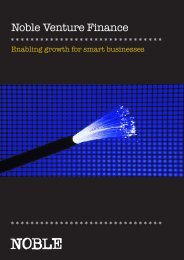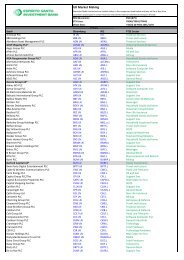SILVER BULLETS - Espirito Santo Investment Bank incorporating ...
SILVER BULLETS - Espirito Santo Investment Bank incorporating ...
SILVER BULLETS - Espirito Santo Investment Bank incorporating ...
Create successful ePaper yourself
Turn your PDF publications into a flip-book with our unique Google optimized e-Paper software.
THIRD QUARTER 2010<br />
Electrolux<br />
Squeezed from all sides<br />
We believe Electrolux is unlikely to replicate its strong performance<br />
in 2009 for 2010. In 2009 it benefitted from both its US-rebranding<br />
and a dramatic fall in its raw materials bill. Fundamentally Electrolux<br />
is in a challenged position, with little power over either its suppliers<br />
or customers, white-hot competition from Asian manufacturers and a<br />
raw materials bill that has increased in 2010, despite recent easing of<br />
some material prices. We reiterate our Sell rating and SEK164 price<br />
target.<br />
Raw materials headwind continues into 2011<br />
Raw materials constitute 17% of sales, and fluctuations in price are a major driver of<br />
earnings. Since 2004 Electrolux has absorbed an increase in its raw material bill of<br />
Skr7.0bn. In 2009, the company positioned itself for falling raw materials prices by<br />
moving to shorter-term contracts. This paid off in 2009, but the company failed to<br />
lock in these lower rates for 2010 believing they would continue to fall. We believe<br />
2Q10 will be the first quarter in which Electrolux experiences a headwind and that<br />
this will continue through the remainder of 2010 (albeit with little additional risk<br />
given 70% of steel required for 2010 has been locked-in with suppliers). Our<br />
analysis indicates a Skr1bn raw material headwind in 2010 and a further Skr1.7bn<br />
headwind in 2011. Without further restructuring savings, this headwind will directly<br />
impact EBIT margins in the same way it can be shown has happened historically.<br />
Margin gap to Capital Goods sector has widened<br />
Electrolux has narrowed the margin gap to its appliance peers from 270bp in 2000<br />
to 80bp in 2009 through restructuring and brand structure rationalisation, but it<br />
has actually increased relative to the Capital Goods sector from 400bp in 2000 to<br />
760bp in 2009. Electrolux’s valuation over the same period has recovered to such<br />
an extent that it now trades inline with Cap Goods peers. Fundamentally<br />
Electrolux is coming from a weaker position than the broader European Capital<br />
Goods due to the characteristics of the appliance industry in which it operates.<br />
Absent a change in the structure of the white goods industry we would continue to<br />
argue a significant discount for Electrolux relative to the Capital Goods sector.<br />
6.0% EBIT margin will be a challenge to achieve<br />
Electrolux introduced a 6.0% EBIT margin goal in 2007 but even with the boost<br />
from lower raw materials and ‘crisis management’ initiatives in 2009, it only<br />
achieved 4.9% last year. In 2010, operational gearing, restructuring savings and the<br />
North American rebranding will help the margin reach 6.1%, we believe, but<br />
thereafter we see the margin falling in the absence of another significant<br />
restructuring programme and charge. This is not inconsistent with Electrolux’s<br />
guidance which is on a pre-restructuring basis, but we believe the market may be<br />
overestimating profitability by assuming a 6.0% post restructuring margin.<br />
Valuation: Deserves a discount to Capital Goods Sector<br />
Electrolux is currently trading on 9.1x2011E EV/EBITA, inline with the European<br />
Capital Goods sector average of 9.2x 2011E EV/EBITA. Our target price applies an<br />
8.5x 2011E EV/EBITA multiple on which we find Skr164 per share value. We believe<br />
Electrolux deserves this discount because 1. its growth has significantly<br />
underperformed the sector over the last 10 years, 2. its margins are structurally<br />
lower and under more pressure, 3. its value proposition to customers is weak<br />
compared to companies with industrial customers, 4. it has limited emerging<br />
market exposure and 5. its financial performance is too heavily dependent on raw<br />
materials and factors beyond management’s control. Our DCF valuation yields<br />
Skr154 per share value.<br />
http://www.execution-noble.com<br />
SELL<br />
13% downside<br />
Fair Value SEK 164<br />
RIC, Bloomberg Code ELUXb.ST, ELUXB SS<br />
Share Price SEK 190<br />
Market Capitalisation $7,516m<br />
Free Float 100%<br />
$m 2009 2010E 2011E 2012E<br />
Sales 109,132 109,123 112,790 116,696<br />
Adjusted EBITA 4,940 6,229 6,205 6,054<br />
Adjusted EPS 11.10 14.22 14.18 13.98<br />
Dividend 4.00 4.60 4.95 4.62<br />
FCF* 5,757 3,647 3,427 4,367<br />
EV Adjustments** 2,168 2,233 2,300 2,369<br />
Net Debt 4,068 1,657 -350 -3,187<br />
* FCF = EBITDA - capex - NWC - int ex. - tax<br />
** Pension, Tax, Equity and non-consolidated assets<br />
X (unless stated) 2009 2010E 2011E 2012E<br />
EV/Sales 0.4 0.6 0.5 0.5<br />
EV/EBITA Adjusted 8.6 10.0 9.8 9.6<br />
P/E Adjusted 10.6 13.4 13.4 13.6<br />
Dividend Yield (%) 2.1% 2.4% 2.6% 2.4%<br />
FCF Yield (%) 15.8% 6.2% 5.8% 7.4%<br />
Net Debt/EBITDA 0.5 0.2 0.0 -0.3<br />
Analysts<br />
Nick Paton, CFA<br />
+44 20 7456 1190<br />
nick.paton@execution-noble.com<br />
Rob Virdee<br />
+44 20 7456 9222<br />
rob.virdee@execution-noble.com<br />
Page 33 of 44




